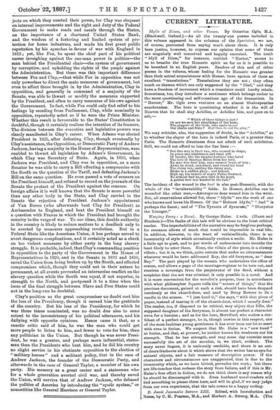Weeping Ferry : a Novel. By George Habra. 2 vole.
(Hurst and Blaokett.)—The faults of this tale will be obvious to the least critical reader. The improbabilities of the narrative may be forgiven perhaps, for romance allows of mach that would be impossible in real life. In addition, however, to the want of verisimilitude, there is an immatnrity of style which occasionally excites a smile. Mr. Halve is a little apt to gush, and to put words of endearment into mouths the least likely to utter them. Hone, the villain of the piece, is a clumsy villain; but it is, we think, quite certain that under no circumstance* whatever would he have addressed Ray, the old ferryman, as " dear Ray." The part played by the woman who undertakes the office of sexton, and allows a page of the marriage-register to be torn oat, and receives a sovereign from the perpetrator of the deed, without a. suspicion that the act was criminal, is only possible in a novel. And it is more convenient for the novelist's purpose, than in accordance with what philosopher Square calls the " nature of things," that the precious document, gained at such a risk, should have been dropped carelessly at the church-door, and need by Betsy Bowser to fix n candle in the sconce. "I just fixed it," she says, " with that piece of paper, instead of tearing it off the church-door, which I usually does." The reader, too, if disposed to be critical, may object that Effie, the supposed daughter of the ferryman, is almost too perfect a character even for a heroine ; and as for the hero, Merriford, who makes a con- fidant of a perfect stranger, he is, though unwise in this respect, one of the most faultless young gentlemen it has ever been our lot to meet with even in fiction. We suspect that Mr. Hales is a " new hand " at fiction, and that, at present, he neither knows his weakness nor his strength. That he has strength, and may some day exercise more sucoessfally the art of the novelist, is, we think, evident. The story never lingers, it is eminently readable, and there is an out- of-doors freshness about it which shows that the writer has an eye for natural objects, and a fair measure of descriptive power. If the characters and circumstances are exaggerated, that is doe to the immaturity which, as we have hinted, pervades the work ; but there are life-touches that redeem the story from failare, and if this is Mr. Halse's first effort in fiction, we do not think there is any reason why he should he discouraged with it. Even hardened novel-readers will and something to please them here, and will be glad, if we may judge from our own experience, that the tale comes to a happy ending.






































 Previous page
Previous page